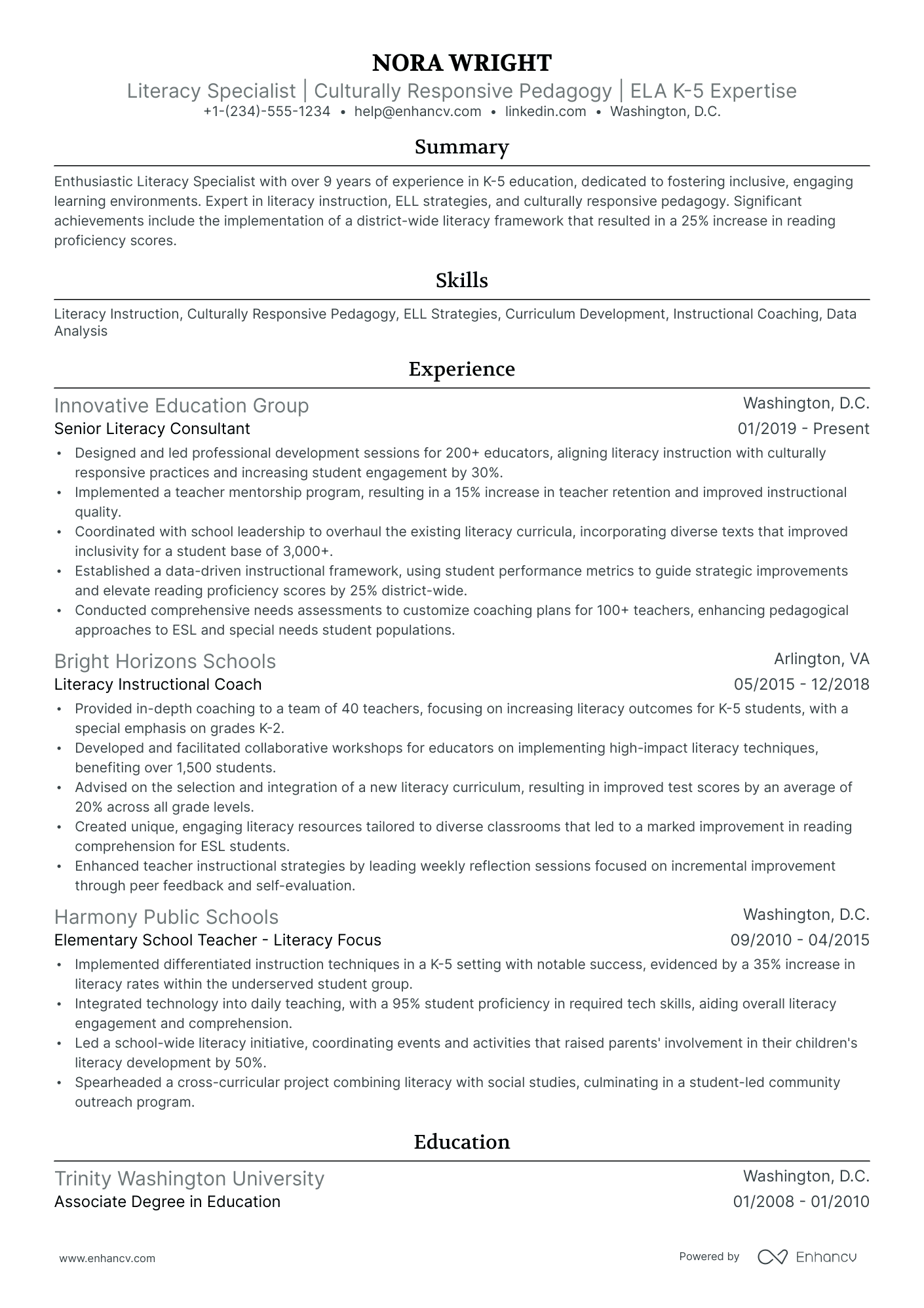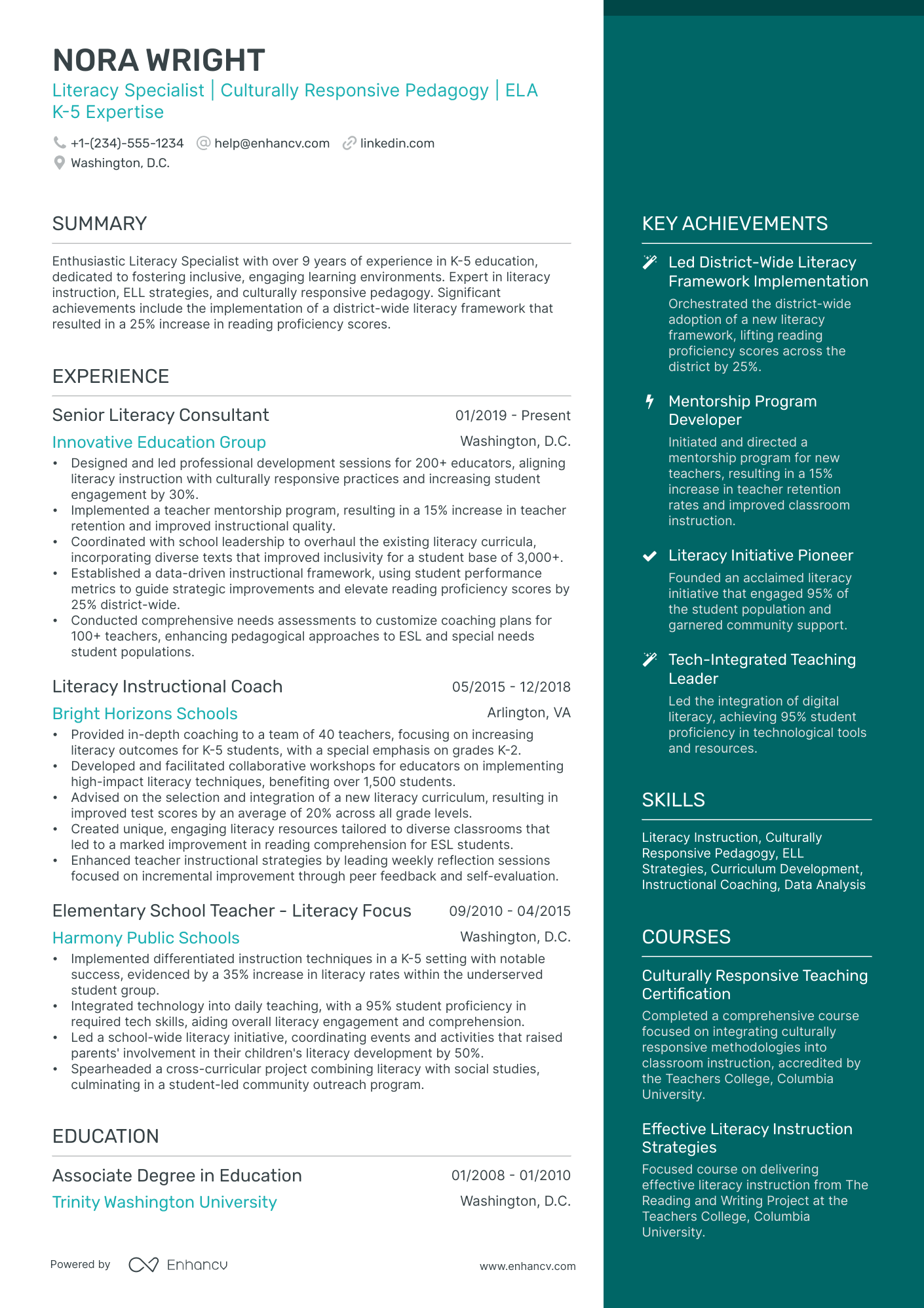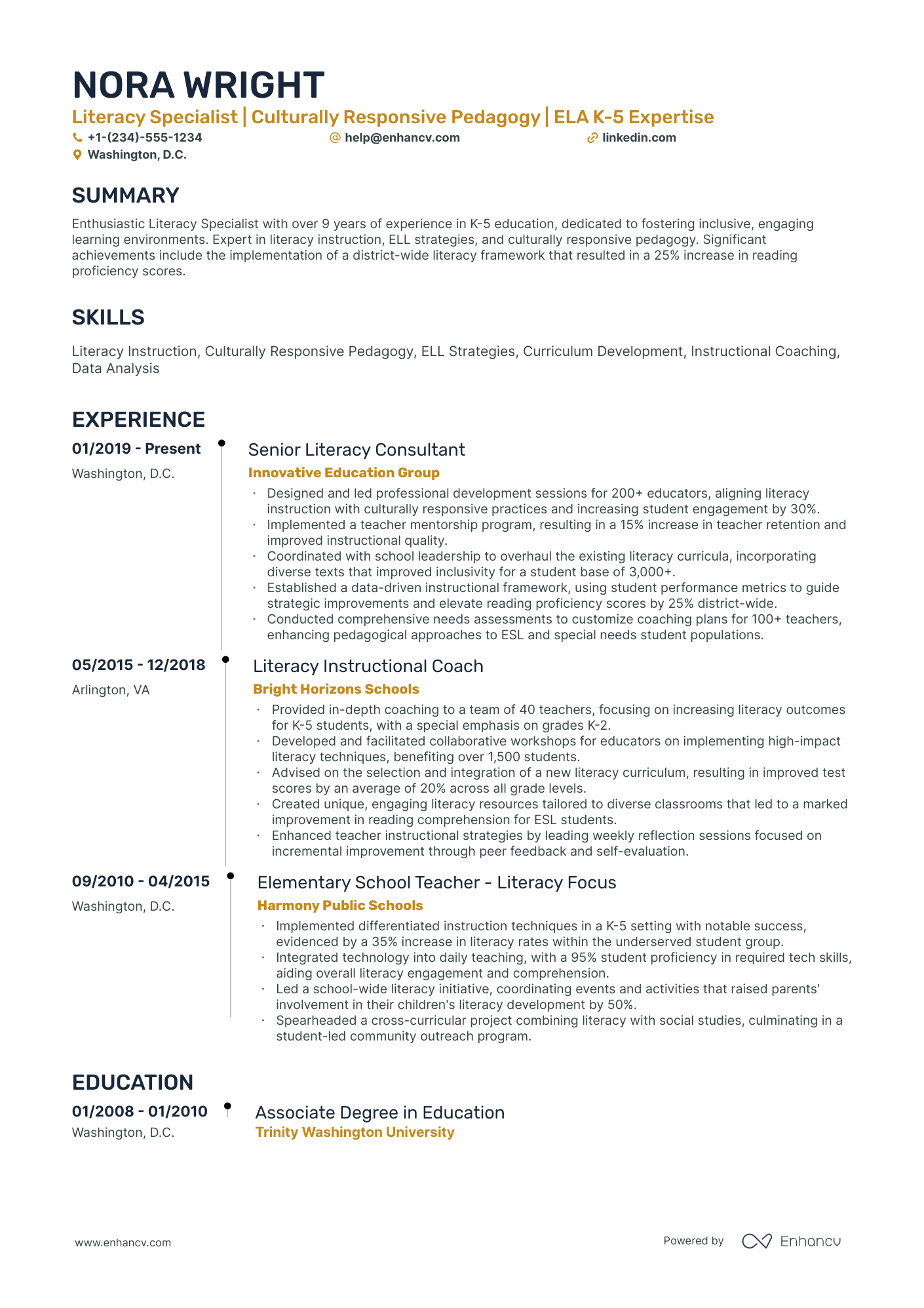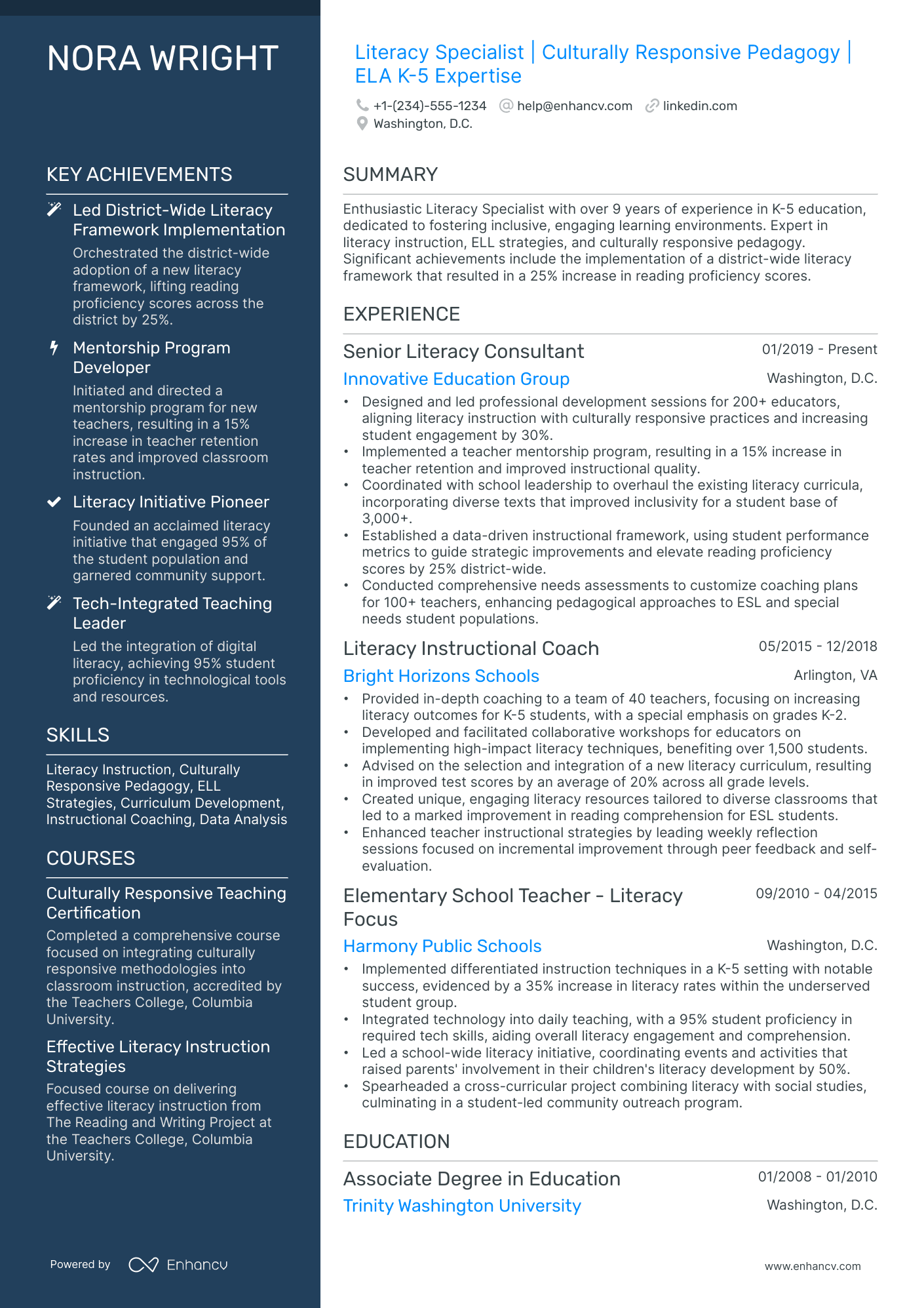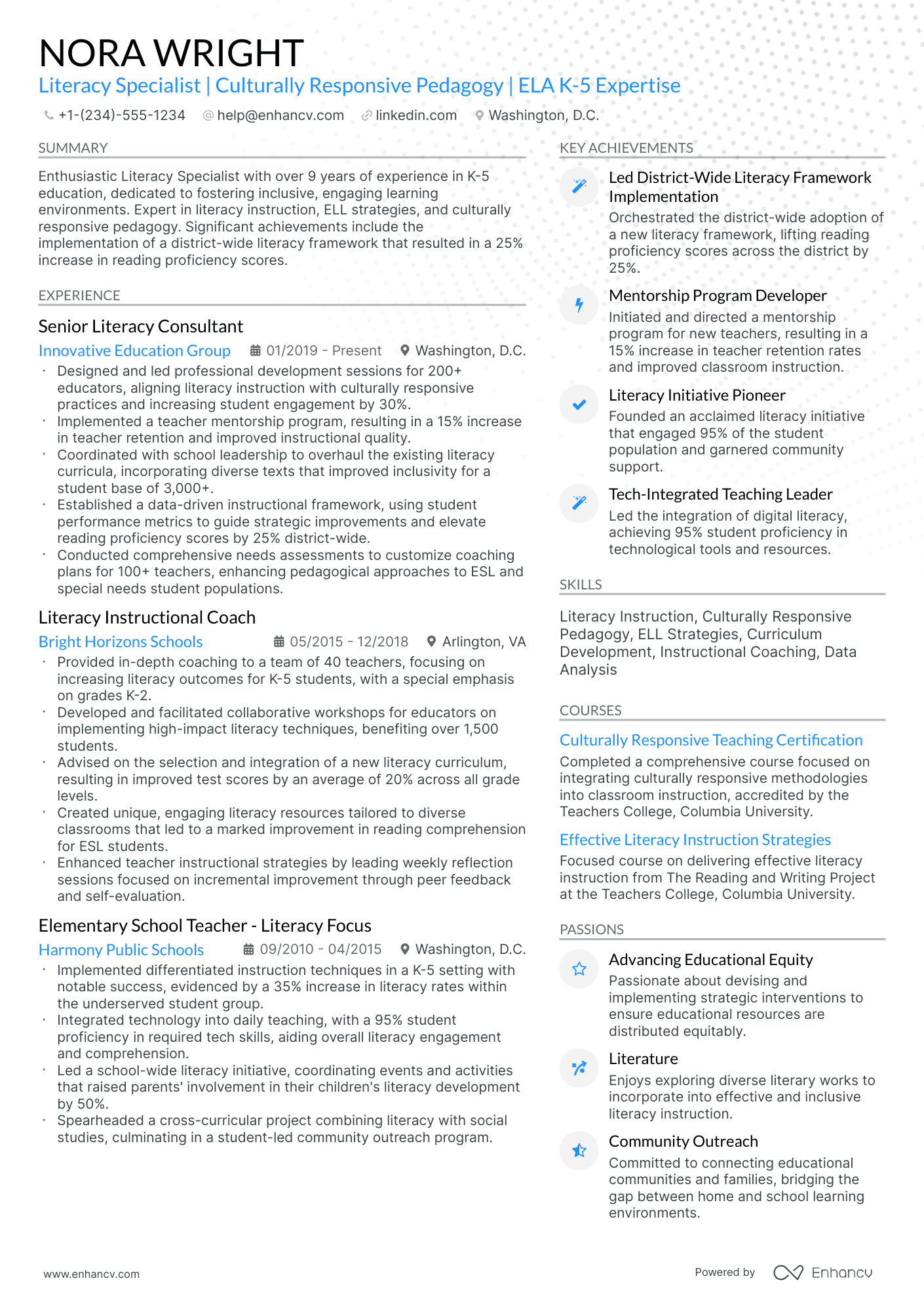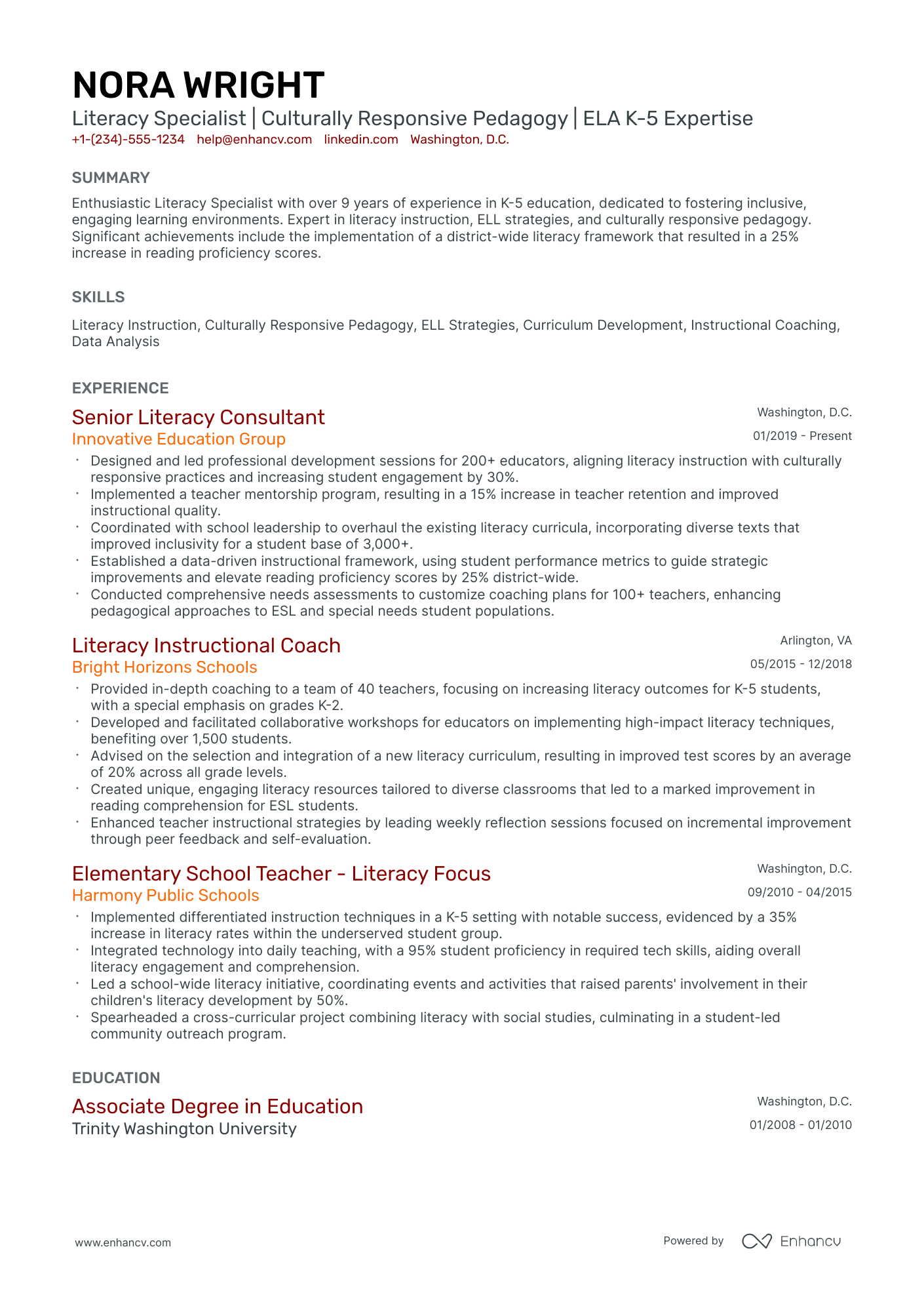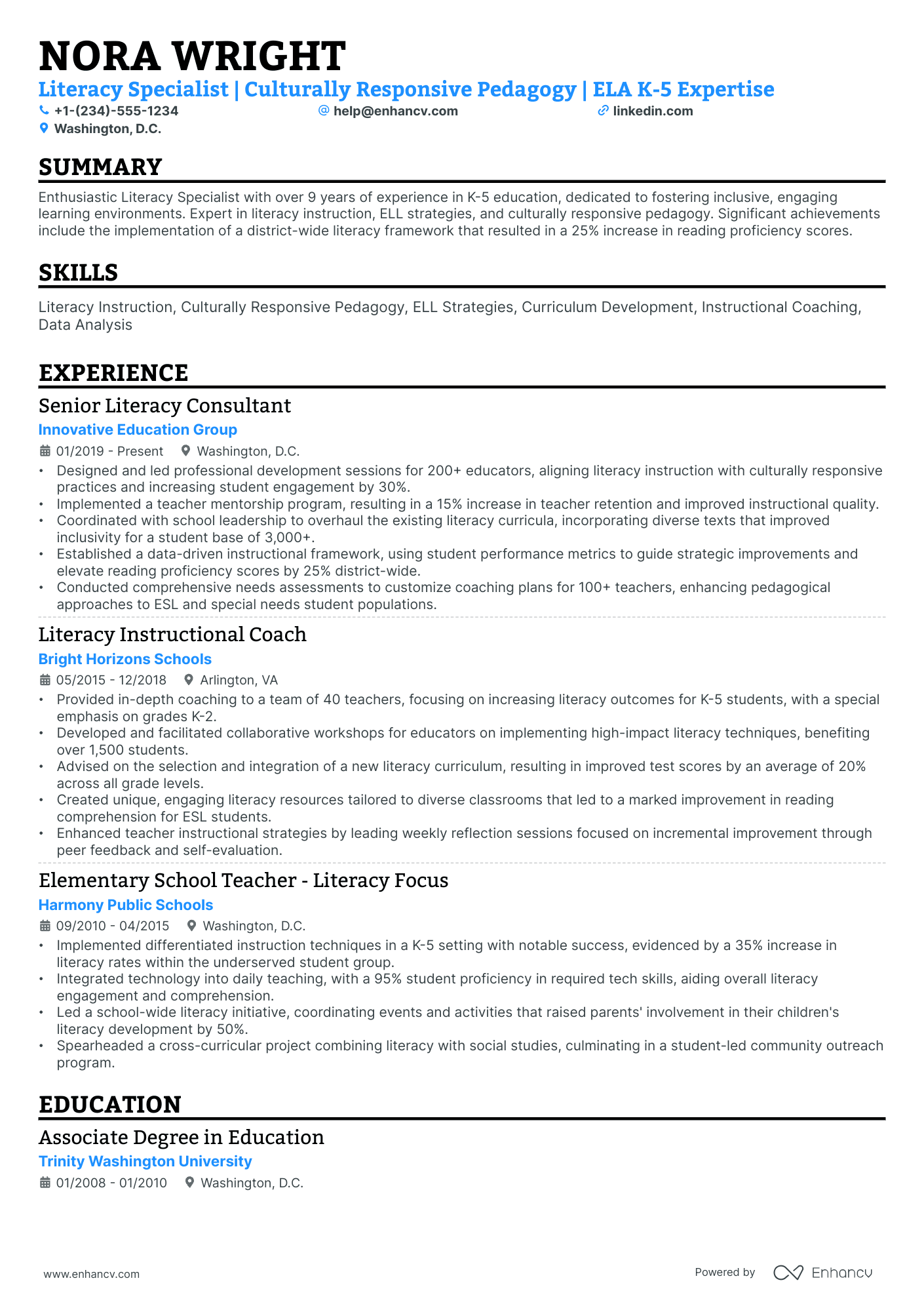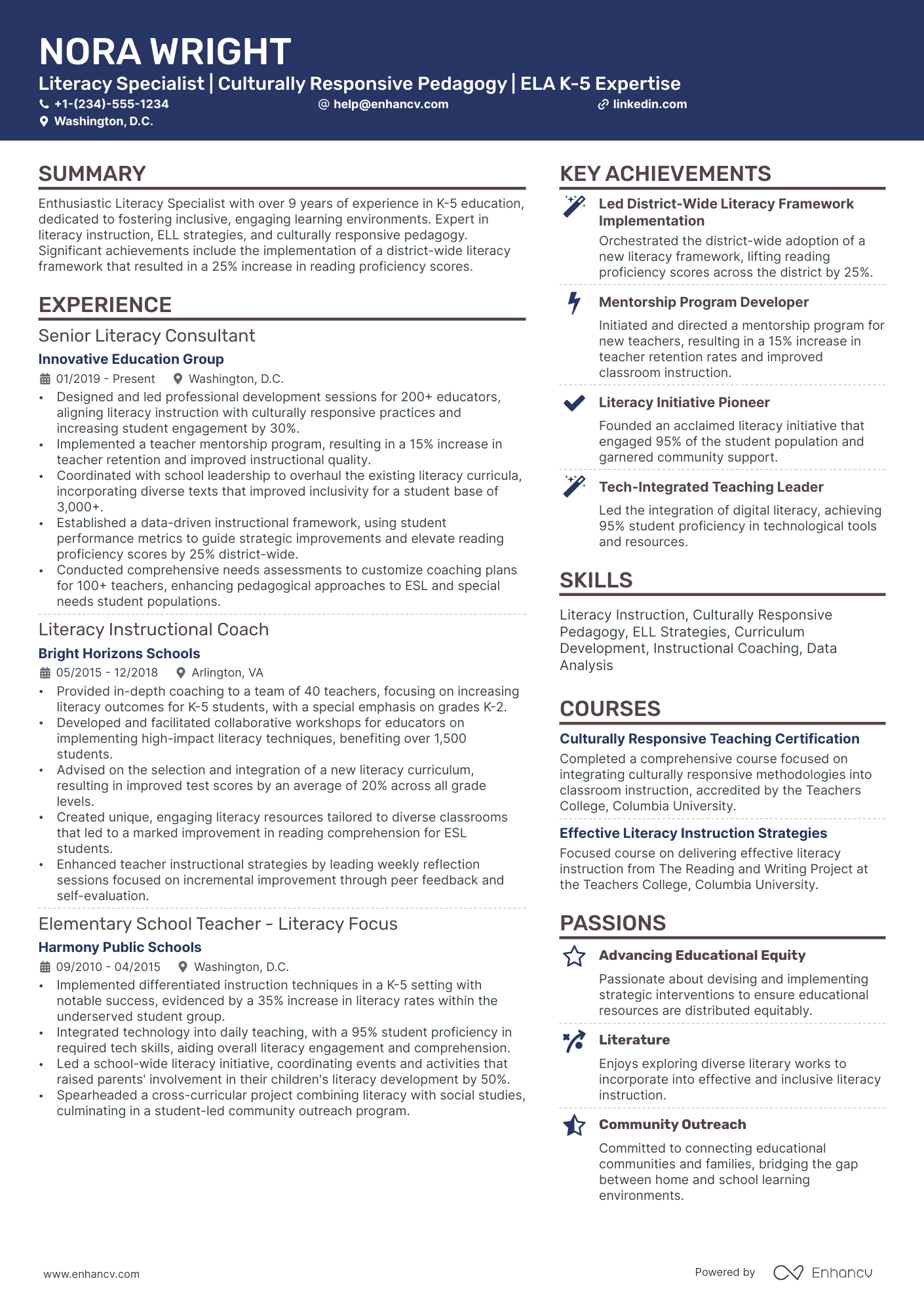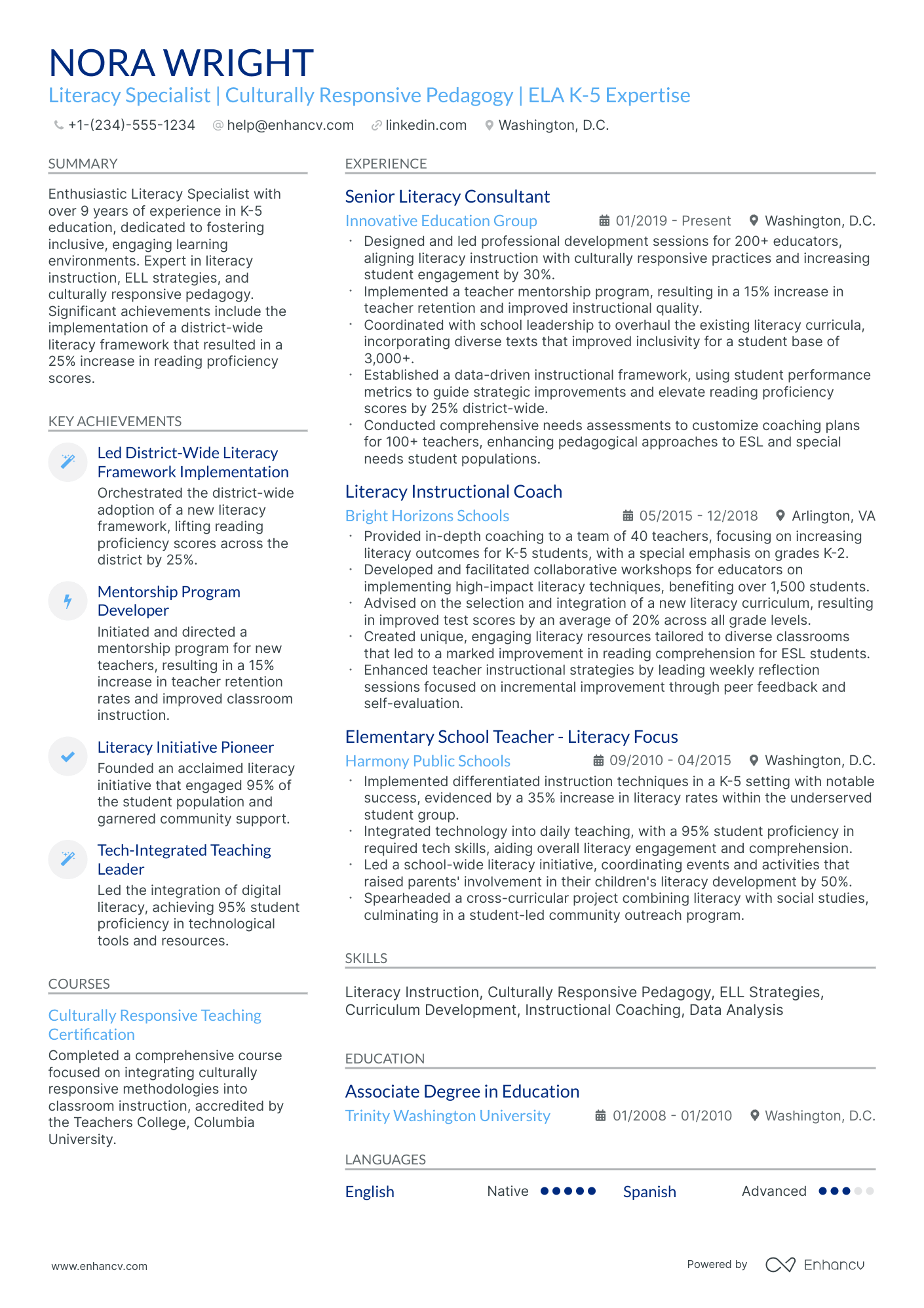As an educational consultant, articulating your diverse experience in a coherent and concise manner can be a significant resume challenge. Our guide offers clear structuring techniques and language tips to help you distill your broad expertise into a powerful, focused resume.
- Utilize real-life examples to refine your educational consultant resume;
- Effectively write the experience section of your educational consultant resume, even if you have minimal or no professional experience;
- Incorporate the industry's top 10 essential skills throughout your resume;
- Include your education and certifications to highlight your specific expertise.
If the educational consultant resume isn't the right one for you, take a look at other related guides we have:
- Teacher For Career Change Resume Example
- Science Teacher Resume Example
- Theatre Teacher Resume Example
- Toddler Teacher Resume Example
- High School Science Teacher Resume Example
- Piano Teacher Resume Example
- Creative Art Teacher Resume Example
- Pre K Teacher Resume Example
- Preschool Director Resume Example
- Distance Learning Teacher Resume Example
Optimize your educational consultant resume format to pass the recruiters' assessment
You may be wondering just how much time you need to spend on designing your educational consultant resume.
What recruiters are looking for is systematised content that is clear and coherent. Thus, your educational consultant resume needs to answer requirements and why you're the best candidate for the role from the get-go.
Often, a clear layout consists of:
- Sorting your experience in the reverse chronological order - starting with your most recent and relevant roles. This is an excellent choice for more experienced professionals;
- Writing your contact information (e.g. personal phone number and email address) and your portfolio or LinkedIn link in your educational consultant resume header. If you're wondering to include a photo or not, always make sure that it's appropriate for the country you're applying in;
- Use the basic, most important educational consultant resume sections - your experience, education, summary, etc. Use your resume's real estate wisely to tell a compelling, professional story and match job description's keywords;
- Don't go overboard with the length of your resume. One page is absolutely fine if you happen to have under a decade of relevant experience.
Are you still wondering if you should submit your educational consultant resume in PDF or Word format ? The PDF has a few more advantages, as it doesn't change the format and the text can't be altered upon application.
Format matters most when your educational consultant resume is assessed by the Applicant Tracker System (or the ATS).
The ATS parses resumes, looking for specific keywords, skills or experience that match the job description.
P.S. We recently did a study on how the ATS works and were able to demystify three of the biggest misconceptions about how it assesses candidate resumes.
To pass the ATS evaluation, select any of the serif or sans-serif fonts. Popular choices that would help your educational consultant resume stand out include Raleway, Exo 2, Montserrat, etc.
Most traditionalists go for Arial or Times New Roman, but it's often the case that many candidates choose these fonts, and you'd thus lose points on the uniqueness front.
Keep in mind the market you’re applying to – a Canadian resume, for instance, might have a unique layout.
Upload & Check Your Resume
Drop your resume here or choose a file. PDF & DOCX only. Max 2MB file size.
PRO TIP
Highlight any significant extracurricular activities that demonstrate valuable skills or leadership.
Essential sections that should make up your educational consultant resume include:
- The header - with your contact details (e.g. email and telephone number), link to your portfolio, and headline
- The summary (or objective) - to spotlight the peaks of your professional career, so far
- The experience section - with up to six bullets per role to detail specific outcomes
- The skills list - to provide a healthy mix between your personal and professional talents
- The education and certification - showing your most relevant degrees and certificates to the educational consultant role
What recruiters want to see on your resume:
- Proven experience in developing and implementing educational programs and curriculum design.
- Demonstrate expertise in educational technology and digital learning tools relevant to modern teaching methodologies.
- Strong history of successful student academic advising and the ability to track and analyze students' progress.
- Extensive knowledge of current educational trends, legislature, accreditation standards, and the ability to adapt strategies accordingly.
- Evidence of effective collaboration with schools, teachers, and other educational staff to improve student outcomes.
Quick formula for writing your educational consultant resume experience section
Have you ever wondered why recruiters care about your educational consultant expertise?
For starters, your past roles show that you've obtained the relevant on-the job training and expertise that'd be useful for the role.
What is more, the resume work experience section isn't just your work history , but:
- shows what you're capable of achieving based on your past success;
- proves your skills with (oftentimes, tangible) achievements;
- highlights the unique value of what it's like to work with you.
To ensure your resume work experience section is as effective as possible, follow this formula:
- start each bullet with a powerful, action verb , followed up by your responsibilities, and your workplace success.
The more details you can include - that are relevant to the job and linked with your skill set - the more likely you are to catch recruiters' attention.
Additionally, you can also scan the job advert for key requirements or buzzwords , which you can quantify across your experience section.
Not sure what we mean by this? Take inspiration from the educational consultant resume experience sections below:
- Led the design and implementation of a K-12 curriculum for a district composed of 15 schools, increasing student engagement by 25% over a three-year period.
- Trained and coached 200+ teachers on instructional strategies and classroom management, contributing to a 10% improvement in teacher retention rates.
- Initiated and managed a successful partnership with an ed-tech company to integrate interactive learning platforms, enhancing the learning experience for over 5,000 students.
- Conducted comprehensive needs assessments for 10 school districts, leading to targeted professional development plans that aligned with state standards.
- Facilitated the adoption of blended learning approaches in over 30 schools, resulting in a 15% increase in student performance metrics.
- Partnered with school leaders to realign budget expenditures, redirecting $2M towards student support services and resource allocation.
- Developed and executed a comprehensive turnaround strategy for a struggling school district, improving graduation rates from 60% to 85% in five years.
- Orchestrated the procurement and implementation of a district-wide learning management system, boosting teacher productivity and enabling personalized instruction.
- Spearheaded the development of a district-wide data analysis protocol, leading to data-informed instructional practices and measurable improvements in standardized test scores.
- Collaborated with educational technologists to integrate 1:1 device to student initiatives in over 20 schools, elevating student digital literacy levels.
- Designed a teacher mentorship program which was replicated across 50 schools, nurturing and developing the next generation of educators.
- Managed a project to revise and standardize testing mechanisms across multiple school districts, streamlining assessment processes and practices.
- Guided the creation of an experiential learning program that increased student satisfaction by 30% as measured by annual surveys.
- Authored a successful grant application leading to a $500K award used to enhance STEM education for underrepresented minorities.
- Formulated policy recommendations that were adopted by several charter schools, contributing to more inclusive and equitable learning environments.
- Advised on the adoption of emerging educational technologies, leading to the creation of a virtual reality lab that served over 1,000 students in its first year.
- Conducted a series of professional development workshops on culturally responsive teaching, improving student engagement across diverse populations.
- Collaborated on developing a school-wide intervention framework to address learning gaps uncovered during the transition to remote learning.
- Led a multidisciplinary team in the reevaluation and redevelopment of special education programs, successfully integrating over 300 students into general education settings.
- Implemented a continuous improvement model for instructional practices that yielded a 20% increase in the average scores of district-wide assessments.
- Formulated and disseminated a set of best practices for virtual learning, which were adopted by several institutions and impacted over 10,000 students.
- Helped schools develop data-driven instruction plans which increased student achievement by aligning educational strategies with assessment data.
- Facilitated a community engagement initiative that brought together parents, students, and educators, leading to the development of a 'whole child' approach to education.
- Oversaw the successful accreditation process for five private schools, enhancing their reputation and enabling them to expand their educational services.
- Designed an assessment reform at a statewide level, positively affecting over 500,000 students by aligning exams with real-world skills.
- Curated and led a series of equity-focused workshops for educational leaders, fostering an increase in culturally relevant pedagogies within their schools.
- Supported the launch of a dual-language program in ten schools, improving language proficiency for over 2,000 students.
- Directed an initiative to redesign high school science curricula, emphasizing inquiry-based learning and increasing student performance by 18%.
- Coordinated cross-functional teams to develop a district-wide response to the digital divide, securing resources to provide all students with internet access and devices.
- Implemented a teacher collaboration platform that facilitated the sharing of best practices, positively impacting instructional quality across multiple subjects.
The following content includes information from "O*NET OnLine" by the U.S. Department of Labor, Employment and Training Administration (USDOL/ETA). Used under the CC BY 4.0 license. The data represents the top responsibilities present on the task lists for educational consultant professionals.
Top Responsibilities for Educational Consultant:
- Maintain accurate and complete student records as required by laws, district policies, and administrative regulations.
- Counsel students regarding educational issues, such as course and program selection, class scheduling and registration, school adjustment, truancy, study habits, and career planning.
- Provide crisis intervention to students when difficult situations occur at schools.
- Counsel individuals or groups to help them understand and overcome personal, social, or behavioral problems affecting their educational or vocational situations.
- Review transcripts to ensure that students meet graduation or college entrance requirements, and write letters of recommendation.
- Prepare students for later educational experiences by encouraging them to explore learning opportunities and to persevere with challenging tasks.
- Refer students to outside counseling services.
- Refer students to degree programs based on interests, aptitudes, or educational assessments.
- Evaluate students' or individuals' abilities, interests, and personality characteristics, using tests, records, interviews, or professional sources.
- Provide students with information on topics such as college degree programs and admission requirements, financial aid opportunities, trade and technical schools, and apprenticeship programs.
Quantifying impact on your resume
- Detail the number of educational institutions you have worked with to showcase your breadth of consulting experience.
- Specify the percentage increase in graduation rates or other success metrics due to your consulting interventions.
- Mention the exact amount of grant money or funding you have secured for educational programs and initiatives.
- Quantify the size of the teams you've led or trained, emphasizing your leadership and collaboration skills.
- Include the number of workshops, seminars, or conferences you have organized or presented at, highlighting your engagement with the educational community.
- State the measurable improvements in student performance or institution rankings subsequent to your consulting services.
- Report the scale of curriculum or program changes you've implemented, including the number of courses affected.
- Cite the number of research projects or papers you've contributed to, underlining your thought leadership in education.
Action verbs for your educational consultant resume
How to shift the focus from your educational consultant resume experience section to your professional profile
If you're at the start of your career journey or transitioning industries, you might be concerned about the lack of professional experience while crafting your educational consultant resume.
How can you effectively present your educational consultant resume experience section under these circumstances?
Rather than a traditional, extensive experience section, demonstrate your expertise through:
- Emphasizing your education. Your academic background might impress recruiters, especially if it includes recent, industry-relevant knowledge;
- Creating a compelling objective statement. The first few sentences of your resume should map out your motivations and career aspirations, offering insight into your goals;
- Highlighting your transferable skills. For example, if you've honed communication skills through volunteering, illustrate on your educational consultant resume how these can benefit a potential employer;
- Detailing your technical background in certifications and skills sections. As a recent graduate, your technological foundations might be particularly attractive to employers looking to develop these skills further.
It's important to remember that employers sometimes prefer candidates with less experience but who are a better cultural fit for their organization.
Recommended reads:
PRO TIP
If you happen to have some basic certificates, don't invest too much of your educational consultant resume real estate in them. Instead, list them within the skills section or as part of your relevant experience. This way you'd ensure you meet all job requirements while dedicating your certificates to only the most in-demand certification across the industry.
Key hard skills and soft skills for your educational consultant resume
At the top of any recruiter educational consultant checklist, you'd discover a list of technical competencies, balanced with personal skills.
Hard or technical skills are your opportunity to show how you meet the essential responsibilities of the role. The ability to use a particular job-crucial technology or software would also hint to recruiters whether you'd need a prolonged period of on-the-job training - or you'd fit right in the job.
But to land your dream role, you'd also need to demonstrate a variety of soft or people resume skills . Employers care about soft skills as they show how each candidate would fit into the team and company culture.
Both types of skills are specific and to best curate them on your resume, you'd need to:
- Create a skill section within which you showcase your hard and soft skills and present how they help you succeed.
- List specific examples of projects, tasks, or competitions, within which your skill set has assisted your results.
- Soft skills are harder to measure, so think about situations in which they've helped you thrive. Describe those situations concisely, focusing on how the outcome has helped you grow as a professional.
- Metrics of success - like positive ROI or optimized workplace processes - are the best way to prove your technical and people skills.
Take a look at some of educational consultant industry leaders' favorite hard skills and soft skills, as listed on their resumes.
Top skills for your educational consultant resume:
Curriculum Development
Data Analysis Tools
Learning Management Systems (LMS)
Assessment Design Software
Educational Technology
Project Management Software
Statistical Software (e.g., SPSS, R)
Content Creation Tools
Online Collaboration Platforms
Presentation Software
Communication Skills
Critical Thinking
Problem-Solving
Adaptability
Interpersonal Skills
Organizational Skills
Empathy
Teamwork
Creativity
Time Management
Next, you will find information on the top technologies for educational consultant professonals from "O*NET OnLine" by the U.S. Department of Labor, Employment and Training Administration (USDOL/ETA). Used under the CC BY 4.0 license.
Top technologies for Educational Consultant’s resume:
- Blackboard software
- Microsoft Access
- ACT WorkKeys
- Counseling software
- Moodle
- Schoology
PRO TIP
List your educational qualifications and certifications in reverse chronological order.
What are the best certificates to add to your educational consultant resume + how to curate your education section
The education and certification resume sections are the underdogs of your educational consultant resume.
They showcase to recruiters that you've invested plenty of time to gain valuable and specific know-how, vital for growth.
As far as the resume education section is concerned:
- Detail only advanced education, specifying the institution and timeframe.
- Indicate your forthcoming graduation date if you're in the midst of your studies.
- Consider omitting degrees that don't align with the job's requirements.
- Offer a description of your academic journey if it underscores your notable achievements.
When curating your degrees and certificates on your educational consultant resume:
- Select only accreditation that matters to the role
- Niche knowledge that could help you stand out as a candidate (as is within the past few years), should be listed towards the top of your resume
- Include any pertinent data for credibility (e.g. institute name, graduation dates, etc.)
- Irrelevant degrees and certifications shouldn't make it on your resume. Those include your high school diploma and any specializations that have nothing to do with the technical or soft skills that are required for the job
As a final note, if you feel tempted to exclude your education or certification from your resume, don't.
These two sections could help you have a better competitive edge over other candidates - hinting that your professional journey in the industry may be for a longer period of time.
Recruiters find all of these educational consultant credentials impressive:
The top 5 certifications for your educational consultant resume:
- Certified Educational Planner (CEP) - American Institute of Certified Educational Planners
- Professional Certified Coach (PCC) - International Coach Federation
- Global Career Development Facilitator (GCDF) - Center for Credentialing & Education
- Professional Certificate in College Admission Counseling - National Association for College Admission Counseling (NACAC)
- Master Career Counselor (MCC) - National Career Development Association
The content below includes information from "O*NET OnLine" by the U.S. Department of Labor, Employment and Training Administration (USDOL/ETA). Used under the CC BY 4.0 license. The data represents the top associations for educational consultant professionals.
Top US associations for a Educational Consultant professional
- American College Counseling Association
- American Counseling Association
- American Psychological Association
- American School Counselor Association
- Association for Career and Technical Education
PRO TIP
If you're in the process of obtaining your certificate or degree, list the expected date you're supposed to graduate or be certified.
Recommended reads:
Should you write a resume summary or an objective?
No need to research social media or ask ChatGPT to find out if the summary or objective is right for your educational consultant resume.
- Experienced candidates always tend to go for resume summaries. The summary is a three to five sentence long paragraph that narrates your career highlights and aligns your experience to the role. In it you can add your top skills and career achievements that are most impressive.
- Junior professionals or those making a career change, should write a resume objective. These shouldn't be longer than five sentences and should detail your career goals . Basically, how you see yourself growing in the current position and how would your experience or skill set could help out your potential employers.
Think of both the resume summary and objective as your opportunity to put your best foot forward - from the get go - answering job requirements with skills.
Use the below real-world educational consultant professional statements as inspiration for writing your resume summary or objective.
Resume summaries for a educational consultant job
- With over 10 years of dedicated experience as an educational consultant, I have successfully guided numerous institutions in curriculum development and teacher training, resulting in marked improvements in academic performance. Expertise in data-driven assessments and bilingual education programs. Spearheaded a district-wide initiative that raised reading proficiency by 25%.
- Former IT project manager with a 15-year track record seeking to transition into educational consultancy. Adept at implementing technology solutions that enhance learning experiences, with a proven history of leading high-stakes projects under tight deadlines. Ready to leverage strong analytical and communication skills to improve educational outcomes.
- Award-winning non-profit manager with over 8 years of experience, transitioning to educational consulting to utilize talents in strategic planning and community engagement. Successfully expanded programs to three new cities, impacting over 5,000 youths. Keen on applying expertise to foster educational equity and innovation in learning strategies.
- As an educational consultant with 12 years' experience, I bring a wealth of knowledge in special education and STEM curriculum design. Instrumental in integrating cutting-edge STEM programs that increased student engagement by 40%. Recognizes the critical importance of personalized learning paths and adept at leveraging technology to enhance educational delivery.
- Eager to embark on a career as an educational consultant, bringing forth a fresh perspective combined with a strong foundation in pedagogical theories and a Master’s degree in Education. Committed to fostering positive educational environments and developing innovative programs that encourage student growth and achievement.
- In my quest to become an educational consultant, I am determined to apply my in-depth knowledge acquired from a Ph.D. in Education Leadership and 5 years of teaching experience. Eager to develop strategic partnerships and initiatives that promote excellence in education and lifelong learning endeavors.
Average salary info by state in the US for educational consultant professionals
Local salary info for Educational Consultant.” Source: My Next Move, National Center for O*NET Development. Accessed 10/15/2024
| State | Average Salary (in USD) |
|---|---|
| US National Average | $61,710 |
| California (CA) | $77,640 |
| Texas (TX) | $64,750 |
| Florida (FL) | $50,950 |
| New York (NY) | $64,540 |
| Pennsylvania (PA) | $64,300 |
| Illinois (IL) | $59,970 |
| Ohio (OH) | $63,000 |
| Georgia (GA) | $60,930 |
| North Carolina (NC) | $51,920 |
| Michigan (MI) | $58,670 |
Extra sections to include in your educational consultant resume
What should you do if you happen to have some space left on your resume, and want to highlight other aspects of your profile that you deem are relevant to the role? Add to your educational consultant resume some of these personal and professional sections:
- Passions/Interests - to detail how you spend both your personal and professional time, invested in various hobbies;
- Awards - to present those niche accolades that make your experience unique;
- Publications - an excellent choice for professionals, who have just graduated from university or are used to a more academic setting;
- Volunteering - your footprint within your local (or national/international) community.
Key takeaways
- Your resume layout plays an important role in presenting your key information in a systematic, strategic manner;
- Use all key resume sections (summary or objective; experience; skills; education and certification) to ensure you’ve shown to recruiters just how your expertise aligns with the role and why you're the best candidate;
- Be specific about listing a particular skill or responsibility you've had by detailing how this has helped the role or organization grow;
- Your personality should shine through your resume via the interests or hobbies, and strengths or accomplishments skills sections;
- Certifications go to provide further accreditation to your technical capabilities, so make sure you've included them within your resume.
